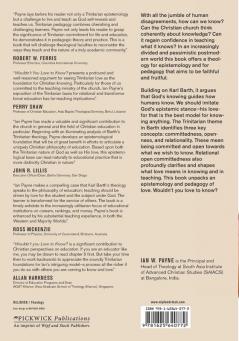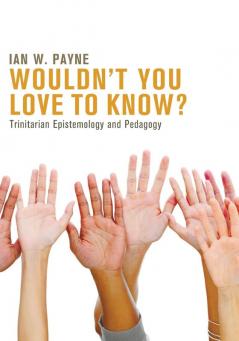English
Paperback
₹3080
(All inclusive*)
Delivery Options
Please enter pincode to check delivery time.
*COD & Shipping Charges may apply on certain items.
Review final details at checkout.
Looking to place a bulk order? SUBMIT DETAILS
About The Book
Description
Author
With all the jumble of human disagreements how can we know? Can the Christian church think coherently about knowledge? Can it regain confidence in teaching what it knows? In an increasingly divided and pessimistic postmodern world this book offers a theology for epistemology and for pedagogy that aims to be faithful and fruitful. Building on Karl Barth it argues that Gods knowing guides how humans know. We should imitate Gods epistemic stance--his love--for that is the best model for knowing anything. The Trinitarian theme in Barth identifies three key concepts: committedness openness and relationality. These mean being committed and open towards what we wish to know. Relational open committedness also profoundly clarifies and shapes what love means in knowing and in teaching. This book unpacks an epistemology and pedagogy of love. Wouldnt you love to know? Payne lays before his reader not only a Trinitarian epistemology but a challenge to live and teach as God self-reveals and teaches us. Trinitarian pedagogy combines cherishing and challenging learners. Payne not only leads his reader to grasp the significance of Trinitarian commitment for life and education he demonstrates it in pedagogic theory and practice. This is a book that will challenge theological faculties to reconsider the ways they teach and the nature of a truly academic community. --Robert W. Ferris Professor Emeritus Columbia International University Wouldnt You Love to Know presents a profound and well-reasoned argument for seeing Trinitarian love as the foundation for Christian knowing. Particularly for those of us committed to the teaching ministry of the church Ian Paynes exposition of the Trinitarian basis for relational and transformational education has far-reaching implications. --Perry Shaw Professor of Christian Education Arab Baptist Theological Seminary Beirut Lebanon Ian Payne has made a valuable and significant contribution to the church in general and the field of Christian education in particular. Beginning with an illuminating analysis of Barths Trinitarian theology Payne develops an epistemological foundation that will be of great benefit in efforts to articulate a uniquely Christian philosophy of education. Based upon both the Trinitarian nature of God as well as His love this epistemological base can lead naturally to educational practice that is more distinctly Christian in nature. --John R. Lillis Executive Officer/Dean Bethel Seminary San Diego Ian Payne makes a compelling case that Karl Barths theology speaks to the philosophy of education; teaching should be driven by love for the student and the subject under God. The learner is transformed for the service of others. The book is a timely antidote to the increasingly utilitarian focus of educational institutions on careers rankings and money. Paynes book is enhanced by his substantial teaching experience in both the Western and Majority Worlds. --Ross McKenzie Professor of Physics University of Queensland Brisbane Australia Wouldnt You Love to Know? is a significant contribution to Christian perspectives on education. If you are an educator like me you may be drawn to read chapter 5 first. But take your time then to work backwards to appreciate the soundly Trinitarian foundations for Ians intriguing model--a process all the richer if you do so with others you are coming to know and love. --Allan Harkness Director of Education Programs and Dean AGST Alliance (Asia Graduate School of Theology Alliance) Singapore Ian Payne is the Principal and Head of Theology at South Asia Institute of Advanced Christian Studies (SAIACS) at Bangalore India.
Delivery Options
Please enter pincode to check delivery time.
*COD & Shipping Charges may apply on certain items.
Review final details at checkout.
Details
ISBN 13
9781625640772
Publication Date
-08-08-2014
Pages
-280
Weight
-498 grams
Dimensions
-178x254x14.93 mm











